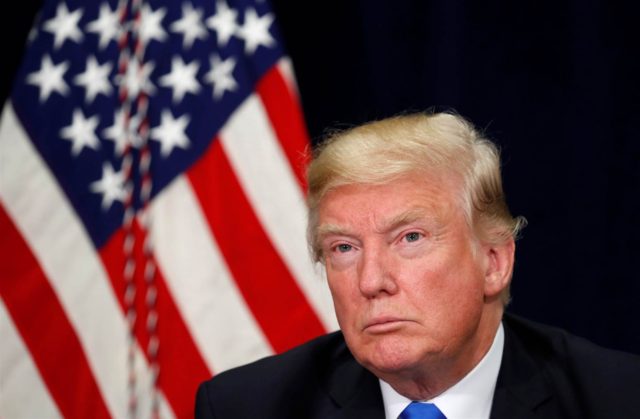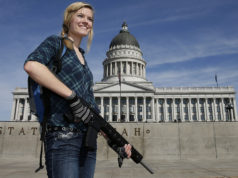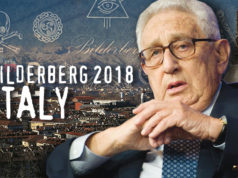Special Counsel Robert S. Mueller III on Monday revealed charges against three former Trump campaign officials — including onetime campaign chairman Paul Manafort — marking the first criminal allegations to come from probes into possible Russian influence in U.S. political affairs.
(WASHINGTON POST) One of the three men charged, former Trump foreign policy adviser George Papadopoulos, admitted making a false statement to FBI investigators who asked about his contacts with a foreigner who claimed to have high-level Russian connections. The agreement was unsealed Monday.
Court documents described extensive efforts Papadopoulos made to try to broker connections with Russian officials and arrange a meeting between them and the Trump campaign, though some emails show his offers were rebuffed.
The third person charged was Manafort’s longtime business partner, Rick Gates.
The charges collectively show how Mueller is aggressively probing the lives of those in President Trump’s orbit — digging into their personal finances while also exploring whether they might have coordinated, or tried to coordinate, with Russia to influence the 2016 election.
Papadopoulos ultimately admitted to lying to the FBI about his interactions with people he thought had connections with the Russian government. He has been cooperating with investigators for three months — having been first arrested and charged in July after landing at Dulles International Airport on a flight from Germany — and has met with the government on “numerous occasions to provide information and answer questions,” according to a court filing.
Manafort and Gates were charged in a 12-count indictment with conspiracy to launder money, making false statements and other charges.
At a court appearance Monday afternoon, Manafort and Gates pleaded not guilty.
The charges against Manafort and Gates did not reference the Trump campaign, a point President Trump noted on Twitter Monday. “Sorry, but this is years ago, before Paul Manafort was part of the Trump campaign. But why aren’t Crooked Hillary & the Dems the focus?????” Trump wrote.
“ . . . Also, there is NO COLLUSION!” he said in a follow-up tweet.
White House Press Secretary Sarah Huckabee Sanders said the special counsel’s announcement “has nothing to do with the president” or his campaign. She said there was “no intention or plan to make any changes with regard to the special counsel.”
“We’ve been saying from day one there’s no evidence of Trump-Russia collusion, and nothing in the indictment changes that at all,” she said.
Sanders sought to minimize the case involving Papadopoulos — which appears directly related to the investigation of possible coordination between the Trump campaign and Russia — asserting he had an “extremely limited,” volunteer role in the campaign. She said that “no activity was ever done in an official capacity on behalf of the campaign in that regard.”
In a January 2017 interview with the FBI, Papadopoulos told the agency that a London-based professor claimed to him he had “dirt” on Hillary Clinton, including “thousands of emails.” But Papadopoulos said initially he viewed the professor as a “nothing.”
In reality, according to his plea, Papadopoulos understood the man had connections to Russian government officials, and he had treated him very seriously as he tried to arrange a meeting between the Trump campaign and Russian officials.
After a March 2016 meeting with the man, who was not identified in court records, Papadopoulos emailed a campaign supervisor and other members of the campaign’s foreign policy team and claimed the professor had introduced him to “Putin’s niece” and the Russian ambassador in London.
Papadopoulos, a low-level member of the Trump campaign and a former intern and researcher at the conservative Hudson Institute, claimed the purpose was “to arrange a meeting between us and the Russian leadership to discuss U.S.-Russia ties under President Trump.”
The government noted, in fact, the woman was not Russian President Vladimir Putin’s niece, and while Papadopoulos expected the professor would introduce him to the Russian ambassador, that never happened. But in the months that followed, Papadopoulos continued to correspond with the woman and the professor about a possible meeting between the Trump campaign, possibly including Trump himself, and Russian officials.
“The Russian government has an open invitation by Putin for Mr. Trump to meet him when he is ready,” Papadopoulos wrote to a senior policy adviser for the campaign on April 25. Two days later, he emailed another high-ranking campaign official wanting “to discuss Russia’s interest in hosting Mr. Trump.”
The campaign officials were not identified in court records, and there was some indication they were wary of the junior member’s efforts. At one point, a campaign official forwarded one of Papadopoulos’s emails to another campaign official, saying, “We need someone to communicate that DT is not doing these trips. It should be someone low level in the campaign so as not to send any signal.” DT would appear to be a reference to Donald Trump.
Sanders said: “He asked to do things. He was basically pushed back or not responded to in any way”
Papadopoulos’s effort continued into the summer of 2016, and in August 2016 a campaign supervisor told Papadopoulos and another foreign policy adviser they should take a trip to Russia. That ultimately did not take place, according to the plea.
Lawyers for Papadopoulos said in a statement: “We will have the opportunity to comment on George’s involvement when called upon by the Court at a later date. We look forward to telling all of the details of George’s story at that time.”
The indictment of Manafort and Gates focused on their work advising a Russia-friendly political party in Ukraine.
[Who did Manafort and Gates work for in Ukraine and Russia?]
The special counsel alleged that for nearly a decade Manafort and Gates laundered money through scores of U.S. and foreign corporations, partnerships and bank accounts, and gave false statements to the Justice Department and others when asked about their work on behalf of a foreign entity.
All told, more than $75 million flowed through offshore accounts, the special counsel alleged. Manafort, the special counsel said, laundered more than $18 million, using his wealth acquired overseas to “enjoy a lavish lifestyle” in the United States, purchasing multimillion dollar properties and paying for home renovation.
Gates did not respond to a request for comment, nor did Jason Maloni, a spokesman for Manafort. Manafort was spotted walking into the FBI’s Washington Field Office Monday morning; Gates was spotted at the federal courthouse in the District.
Spokespeople for Mueller and the Justice Department declined to comment over the weekend. A Justice Department spokeswoman declined to comment Monday, and a spokesman for the special counsel’s office did not return messages seeking comment.
According to the indictment, Manafort and Gates arranged to hire two Washington-based lobbying firms to work on behalf of their Ukrainian clients, arranging meetings with U.S. officials and boosting their public image in the United States.
Though it was not named, one of the firms referenced in the indictment was The Podesta Group. Tony Podesta, the head of the firm, announced to colleagues Monday he was stepping down.
[Democratic power lobbyist Podesta steps down]
Prosecutors say that Manafort and Gates arranged for a Brussels-based nonprofit to nominally hire the Washington companies to hide the fact that the two men were working for Ukrainian government officials; otherwise they would have been required to register under the Foreign Agents Registration Act.
In fact, prosecutors allege, Manafort was communicating directly with then-Ukrainian President Viktor Yanukovych about the effort, promising in 2012 to provide him weekly updates about the effort.
To further obscure Ukrainian involvement in the lobbying effort, prosecutors say payments to the Washington firms were routed through obscure offshore companies. Prosecutors say that when the Department of Justice approached Manafort and Gates in 2016 and 2017 about whether they should have registered as foreign agents for the work, they responded with false and misleading letters, indicating they had not directed the lobbying effort and asserting they did not hold records reflecting their work, even though later searches showed they did, according to the indictment.
Manafort and Gates also were accused of willfully and intentionally trying to hide funds kept in foreign bank accounts — Manafort from 2011 to 2014 and Gates from 2012 to 2014. And Manafort was accused of filing fraudulent tax returns — stating on tax forms he filed from 2008 to 2014 that he controlled no foreign bank accounts.
[How Trump adviser Manafort revived his career — and business fortunes — in Ukraine]
The men made tens of millions of dollars for themselves, the special counsel alleged. From 2008 to 2014, according to the indictment, Manafort arranged to wire $12 million from offshore accounts to pay for personal expenses — including $5 million to a home renovation contractor in the Hamptons, more than $1.3 million to a home entertainment and lighting vendor based in Florida, $934,000 to an antique rug dealer in Alexandria, and $849,000 to a men’s clothier in New York.
While the men were set to first appear before a magistrate judge — as is normal — the case was assigned to U.S. District Judge Amy Berman Jackson, 63, a 2011 Barack Obama appointee.
Jackson worked as federal prosecutor in the District after graduating from Harvard Law School and specialized in complex criminal and civil trials and appeals at Trout Cacheris. While at the firm, she represented former Democratic congressman William J. Jefferson at his corruption trial, made famous by the $90,000 in bribe money stuffed into his freezer and a legal battle over the raid of his Washington office.
Jackson contributed $1,000 to Bill Clinton’s 1992 Democratic campaign.
Mueller was appointed in May to oversee the probe of possible coordination between the Trump campaign and Russia, taking over work that the FBI had begun in July 2016. Their interest in Manafort, though, dates back to at least 2014 — long before Mueller was appointed or Manafort was connected to the Trump campaign.
While Mueller’s probe has focused on Manafort and former national security adviser Michael Flynn, investigators have shown interest in a broad array of other topics.
Those include meetings the president’s son-in-law, Jared Kushner, had with the Russian ambassador and a banker from Moscow in December, and a June 2016 meeting at Trump tower involving the president’s son, Donald Jr., and a Russian lawyer. Mueller’s team has requested extensive records from the White House, covering areas including the president’s private discussions about firing James B. Comey as FBI director and his response to news that Flynn was under investigation, according to two people briefed on the requests.
Mueller is also investigating whether Trump obstructed justice leading up to Comey’s firing. His team has been actively presenting records and bringing witnesses before the grand jury in D.C. for the last three months.
Trump hired Manafort onto his campaign in March 2016, when he was locked in what looked to be a months-long slog against Sen. Ted Cruz of Texas and Ohio Gov. John Kasich to amass delegates and secure the Republican nomination. Manafort’s role early on was to oversee the Trump campaign’s delegate operation and to prepare for a potential floor fight at the Republican National Convention that June.
Manafort, along with his deputy Gates, initially shared a makeshift office on the fifth floor of Trump Tower, taking over a conference room where a giant map of the United States hung on the wall marking the cities and towns where Trump had campaigned.
During their time at Trump Tower, Manafort cultivated close relationships with Trump’s children and quickly earned their internal support. Manafort’s authority over the campaign grew and, with the strong backing of the Trump family, he soon was named the campaign chairman.
Manafort feuded internally with campaign manager Corey Lewandowski as they two men jockeyed to gain control over campaign strategy and operations. In June 2016, Trump fired Lewandowski at the urging of Donald Trump Jr., Ivanka Trump and her husband, Jared Kushner.
Manafort assumed full control of the campaign, with Gates operating as his No. 2. Together, they orchestrated the GOP convention in Cleveland, oversaw Trump’s vice presidential selection process and devised the campaign’s strategy for the general election against Democratic nominee Hillary Clinton.
In August, however, after news reports investigating Manafort’s past work for Yanukovych in Ukraine, Manafort was sidelined and effectively replaced at the helm by Stephen K. Bannon and Kellyanne Conway, who respectively were named the campaign’s chief executive officer and manager. Manafort then resigned from the campaign, but Gates, his business partner and protege, continued to play an important role.
After the election Gates directed the inauguration plans, including fundraising, under Tom Barrack, Trump’s close friend and adviser.
FBI agents working for Mueller raided Manafort’s home in Alexandria in late July, armed with a search warrant that allowed them to enter at dawn without warning the occupants. Such an invasive search is only allowed after prosecutors have convinced a federal judge that they have evidence of a crime and they have reasonable concern that key evidence could be destroyed or withheld.
Prosecutors also warned Manafort they planned to indict him, according to two people familiar with the exchange. People close to Manafort and Gates, though, said the indictment came as a surprise to both.
Though both men knew Mueller had been closely scrutinizing their behavior, they had expected some kind of alert when an indictment was imminent. Even over the weekend, they were telling people close to them that they had received no such notification and did not believe they were the subject of the seal charges.
The tactic might suggest Mueller hoped to use the element of surprise against the two men to potentially stun them into a desire to cooperate against other members of Trump’s team.
Flynn’s lawyer, Robert Kelner, said late Friday, “we are not commenting tonight.” A person familiar with Flynn’s defense said he, too, had received no notice of pending indictment.
Wayne Holland, a McEnearney Associates real estate agent who helped Manafort buy the condo in Alexandria, Va., that was raided by the FBI this summer, testified Oct. 20 before the grand jury in Mueller’s probe after he and his firm were unsuccessful in an effort to quash subpoenas, Holland said Friday.
Holland declined to discuss his testimony, first reported by Politico, but confirmed that an opinion unsealed Friday denied his and his firm’s motion to quash a subpoena by claiming real estate broker records are confidential under Virginia and District laws.








